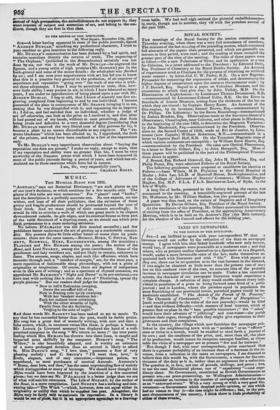"AsixtrALs," says our Botanical Dictionary, "are such plants as are
of one year's duration, or which continue for a few months only. The plants of this tribe are very numerous." For "plants" read "books," and the description is a perfectly accurate one. No one expects, no one wishes, and least of all their publishers, that the existence of these pretty and fragile productions should be protracted beyond the year of their birth. And we must judge of their contents accordingly. It would be idle to criticize a work of which one great merit is its elegant dove-coloured outside, its gilt edges, and its external fitness to form part of the table ftirniture of a drawing-room, as we should one which puts . ror,th pretensions to a more enduring existence. We believe D'AtmatriE was the first musical annualist ; and few publishers better understand the art of getting up a marketable commo- {Hey. His present Bijou-is little either better or worse than its prede- cessors: there are the same names,—Bistior, Hoax, C. SMITH, Ban- YETT, RODWELL, HERZ, KALKERENNER, among the musicians ; PLANCHE and Mrs. HEMANS among the poets ; the author of the „Roué, and Lord NUGENT among the prose contributors. Some of the gentlemen and lady versifiers are, and are likely to remain, unknown to fame. The sonnets, songs, elegies, and such like effusions, which here Meander through such a "meadow of margin," are, for the most part, a =ere repetition of fashionable slang phraseology, with not a grain of originality or inspiration. Of course, there are degrees of comparison even in this sort of writing; and as a specimen of rhymed nonsense, we apprehend Mr. RAYMOND'S "Night and Dawn" to be pre-eminent—we have met with nothing like it since the days of " Fluttering, spread thy purple pinions." But our, readers shall judge for themselves.
" Now to lull'd Endymion creeping, Down the unruffled hill of air, Now in floating robe quick sweeping With her 'tendant maidens fair : Each her radiant brow entwining With the silver wreaths of light, Faintly from the sky declining,
Verging to the cave of night." tasked And these words Mr. BARNETT has been to set to music. To say that he has succeeded better than the poet, would be feeble praise. Mis song has a great deal of masterly writing, with now and then a false accent, which, in nonsense verses like these, is perhaps a beauty. Kr. LODGE (a Liverpool amateur) has displayed the hand of a well- practised composer in the song "We return no more :'' the true poetic feeling which Mrs. HEMANS has thrown into these lines, is caught and Imparted most skilfully by the composer. BISHOP'S song, "The 'Widow," is also beautifully adapted, and is worthy an existence Of a more prolonged duration than an annual is likely to afford It. Miss DANCE'S song, " I love thee," possesses a flow of very pleasing melody ; and C. SMITH'S "I'll meet thee, love," is lively, elegant, and of easy execution,—important points, -we apprehend, to most purchasers of musical Annuals. ADDISON'S Home, dear love, and thee," has the same unpretending flow of melody Which distinguishes so many of his songs. We should have thought the .Bijou would have been improved by the insertion of a few concerted pieces ; but we dare say Mr. D'ALstarNE is a better judge than we are of what will suit his customers. The Life of MOZART, by the author of . the Roué, is a mere compilation. Lord NUGENT has a striking and inte- resting tale.--" The Witch "—which, however, does not equal either in -originality or utility that which he supplied last year. Altogether, the Bijou may be fairly said to maintain its reputation. In a library it woad be out of place, but it is en appropriate appendage I° a drawing. room table. We had well nigh omitted the pictorial embellishments-- in merit, though not in number, they With the proudest annual of the year 1831.


























 Previous page
Previous page